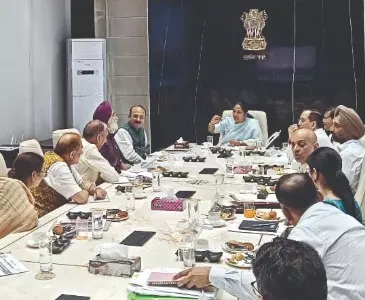CM and Mayor chair meet as biomining hits 25K tonnes a day

New Delhi: A high-level review meeting on solid waste management in the Capital was held on Thursday under the chairmanship of Chief Minister Rekha Gupta, along with the Mayor of Delhi, Raja Iqbal Singh. Senior representatives of the Municipal Corporation of Delhi (MCD) and the Government of NCT Delhi, including Urban Development minister Ashish Sood, Deputy Mayor Jai Bhagwan Yadav, Standing Committee Chairperson Satya Sharma, Deputy Chairman Sunder Singh, Commissioner Ashwani Kumar, and Additional Commissioner Jitender Yadav, attended the meeting.
The deliberations centred on strengthening the city’s waste management infrastructure and reducing dependence on landfills. The Mayor informed that MCD has enhanced its daily biomining efficiency at dumpsites from 15,000 tonnes per day to 25,000 tonnes per day, marking a significant milestone in ongoing waste reduction efforts.
The Chief Minister directed officials to expedite the commissioning of Waste-to-Energy (WTE) plants by 2026 to eliminate fresh waste dumping at existing landfill sites. She assured that her office would proactively intervene to address bottlenecks, including shifting of power transmission lines, to ensure timely implementation.
As part of decentralisation measures, each municipal zone will have dedicated waste management centres of suitable capacity to ease the pressure on overburdened dumpsites. The ongoing “Delhi’s Freedom from Garbage” campaign has also been extended until October 2, 2025, reaffirming the administration’s commitment to a cleaner city.
Additional proposals discussed included constructing 10 multilevel parking facilities in high-footfall markets such as Karol Bagh and Kamla Nagar, developing two biogas plants for dairy waste, and preparing a comprehensive funding plan to support sanitation staff and gardeners.
Gupta stressed the importance of integrated efforts, timely execution, and community engagement. “The vision of a cleaner, greener, and sustainable Delhi will only be achieved through coordination, innovation, and public participation,” she said.



